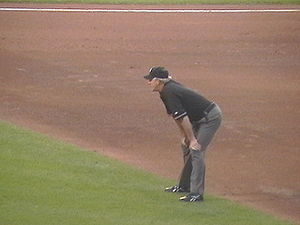- Image via Wikipedia
This post is being written in a fit of injustice. Last night, Armando Galarraga of the Detroit Tigers, backed up by a solid and at times sparkling defense, threw a perfect game. Well, it was only imperfect in one respect — the first-base umpire blew what should have been the final call of the game, signaling a hitter safe when both live-action and replayed film showed clearly that the player was out.
Galarraga remained poised, and the next batter hit into a 5-3 final out, ending the game.
From a purely objective point of view, Gallaraga threw a perfect game. It was demonstrably perfect. It would survive peer-review. No batter reached base without striking out or being thrown out. Twenty-seven at-bat attempts, and all twenty-seven were unsuccessful.
By all measures, it was a perfect game.
But one single reviewer — the first-base umpire — rejected it. His botched call “stole” the perfect game from Gallaraga.
Baseball should have learned this lesson long ago — more than one peer-reviewer is sometimes necessary. In this case, instant replay would have resolved the situation correctly.
Now, the only recourse is a retraction.
Can the baseball culture bring itself to restore the perfect game? Will the clear evidence that the penultimate out (as it now stands) was actually the final out prove decisive? Will rational reflection trump man-made rules for a game of conceits and fabrications?
Can a ray of rationality penetrate the mystique of baseball?
Throwing a no-hitter is a major accomplishment for a baseball pitcher. Throwing a perfect game is an order of magnitude more impressive. To have this pinnacle of athletic control, nerves, endurance, and ability stolen without recourse and calm post-hoc reflection would be a huge injustice.
Bud Selig, the Commissioner of Major League Baseball, must overturn the call and restore the perfect game.
Only in that way can the game of baseball truly have a chance of being perfected.
Discussion
5 Thoughts on "Umpiring and Peer-Review: Why a Perfect Game Is Still a Perfect Game"
While it is fine to suggest that Bud Selig should invalidate the umpire’s call and restore the perfect game, I have to ask how likely that is to occur. To continue with your analogy of baseball and scholarship, don’t we have to preserve the record as it stands? Publishers aren’t allowed to rescind published articles that have subsequently been found false — remember cold fusion?
There is historical precedent for the commissioner changing the record books; Fay Vincent revised history for nearly 50 no-hitters in the early 1990s.
I support the idea of MLB formally recognizing Galarraga as having pitched a perfect game; however, I hope that such recognition would be accompanied by:
– The box score forever showing 9 innings pitched, 28 batters faced, 1 hit, 0 walks, and 0 errors (you can’t pretend the 28th batter never existed, nor can you really overturn the call on the field without a rules framework for doing so).
– Adoption of instant replay for all boundary calls (fair/foul, home run/not a home run, and safe/out). I’ve always supported the use of instant replay on boundary calls because there is no room for interpretation. Strike zones are another story.
Baseball is a game rich in history and folklore. Perhaps there’s greater value in being part of a unique story, “the perfect game that wasn’t”, than in being one of 23 pitchers who threw an “ordinary” perfect game. Extraordinary circumstances are better remembered, just ask “the homer in the gloamin'”, the “Merkle boner” or the “pine tar incident”.
That’s a very good and appropriate point. No matter what, he won’t lose the infamy, and there is a certain prestige to it. Maybe the next time someone else is robbed of a legitimate prize, we’ll say he was “Galarraga’d”? Or, more appropriately, “Joyce’d”?
“Joyce’d” sounds better in this context.
BTW, it looks like Selig won’t be reversing the call. Interestingly, Wikipedia’s entry on Selig is already updated, with references.

![Reblog this post [with Zemanta]](http://img.zemanta.com/reblog_e.png?x-id=d7d4e216-66f2-40dc-ae03-370b7d325d99)


